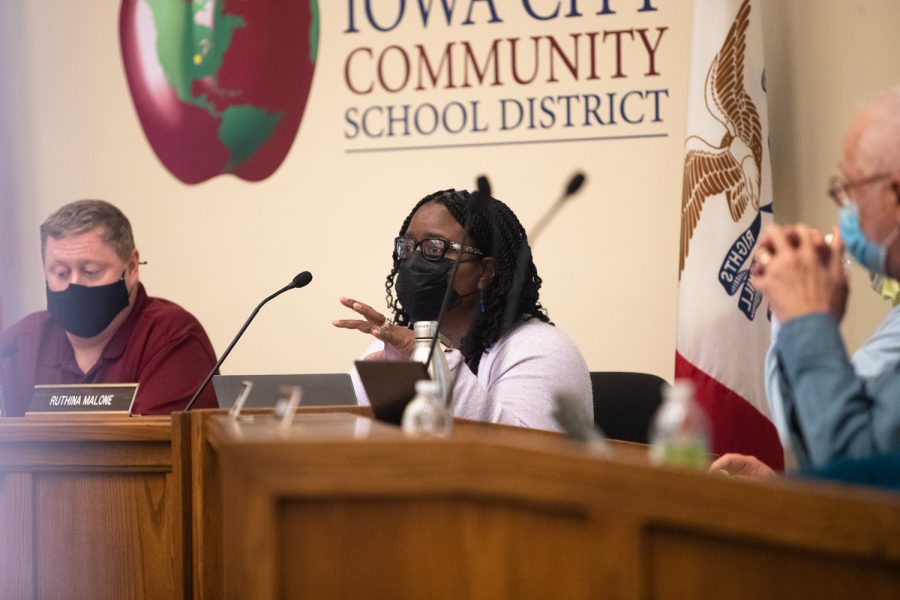Iowa City Community School District looks for funds to keep after-school programs going
The decision comes after concerned families spoke about the loss of after-school program grant funding for Mark Twain Elementary School.
Board member Ruthina Malone speaks at a meeting of the Board of Directors at the Iowa City Community School District Administration Building in Iowa City Tuesday, Nov. 9, 2021.
April 11, 2023
The Iowa City Community School District is looking into ways to fund after-school programs at multiple schools in the district after federal funding going toward them was cut.
School board members said at the meeting Tuesday that it plans to allocate as many resources as possible to support scholarship opportunities for after-school programming, but accepts there will be some losses.
Three schools in the Iowa City Community School District are currently utilizing grant funds from the 21st Century Community Learning Centers Program to support after-school programs. These schools include Twain, Alexander, and Kirkwood Elementary Schools.
The 21st Century Community Learning Centers program is federally funded by the U.S. Department of Education and supports students in high-need, high-poverty communities. Students can attend after-school and summer learning programs for free.
The grant has a 10-year limit for any school receiving 21st Century Grant funding, and Mark Twain Elementary School will stop receiving funding in June of 2023.
Once the school stops obtaining 21st Century Grant funding, Iowa City Community School District will move the school to a funding structure that centers around private pay by parents or guardians, Department of Human Services Child Care Assistance and Secured an Advanced Vision for Education funds.
The district utilizes four entities to conduct after-school programming, and most do not utilize the 21st Century Grant funds. The four entities conducting these programs include the Independently Operated Parent-Run Boards, Neighborhood Centers of Johnson County, Champions, and Coralville Parks and Recreation.
All entities except Coralville Parks and Recreation accept Child Care Assistance funds, which a family must apply for and be accepted before the money can be utilized. The federal funds are also used to finance after-school programs, which come from state sales tax money allocated by the state to districts on a per-student basis.
The Neighborhood Centers of Johnson County conducts after-school programming for Mark Twain Elementary School. The result of the loss of 21st Century grant funding is the number of available scholarship opportunities for after-school programs will see a reduction.
With the 21st Century Grant funding, 30 spots are available for students who need free child care after school. That number will drop when the funding stops in June. The program aims to help children meet state standards in core subjects and provide a place for parents to leave their children while they work.
Iowa City Community School District saw 81 percent academic growth because of these after-school programs, with 95 percent of families reporting a welcoming feeling according to data from the school district.
During the school board’s meeting on March 28, families in support of the funding said a safe place for their children is not an option without the centers. The group asked the district to provide $25,000 in direct payments to Neighborhood Centers of Johnson County to allow parents to utilize after-school programming for free.
Jackie Torres, a parent of a child who attends Mark Twain Elementary School, told the school board at the March 18 meeting that she could not afford to put her children in these programs without assistance from the federally funded grant.
“I’m here today so I could ask you for help for the school program. It’s very important for our children,” Torres said.
She added she would not be able to pay for the program without grant assistance, which would be devastating for her children.
Assistant Director of the Neighborhood Center of Johnson County Ashley Clark told the school board at the March 28 meeting that she oversees four after-school programs that serve 200 children in the district. Clark said these programs are exceptionally important and urgent for the families involved.
“The presence of our programs and others like this in the district impacts their families and allows them to have and keep jobs so that they can pay their bills and feed their children,” Clark said.
Chastity Dillard, development and communications director for the Neighborhood Center of Johnson County, also told the board at the meeting that the organization is launching a campaign to raise $100,000 to continue these after-school programs.
Dillard said $25,000 would be paid by the Neighborhood Center of Johnson County to support 16 kids over the summer. However, this leaves few spots for the many in need of the programs. She asked to have time allotted to continue the discussion on the topic in a future board meeting, as well as asking the board to match the $25,000 the center contributed to these programs.
The school board responded Tuesday to these comments during the board meeting. The board said the district does not have the resources to continue giving the same amount of scholarships as was possible with 21st Century Grant funding but is looking into other options.
Board President Ruthina Malone said the school board is working to find ways to continue to fund these after-school programs, but cannot guarantee the same number of opportunities available with 21st Century Grant funding.
“We’re losing some scholarships, but the district will be working to make allocations for some of those scholarships. We can’t do all, but we’re also looking into additional funding we’re working with right now, the neighborhood centers since that’s a provider for that program,” Malone said.
Fellow board member J.P. Claussen expressed sympathy for the families but explained there are few other funding options available to the district to fill the void left by the 21st Century Grant.
“At the end of the day, it just sucks that we lost this funding and these grant opportunities, and unless you replace that with something, you can’t manufacture that,” Claussen said.



